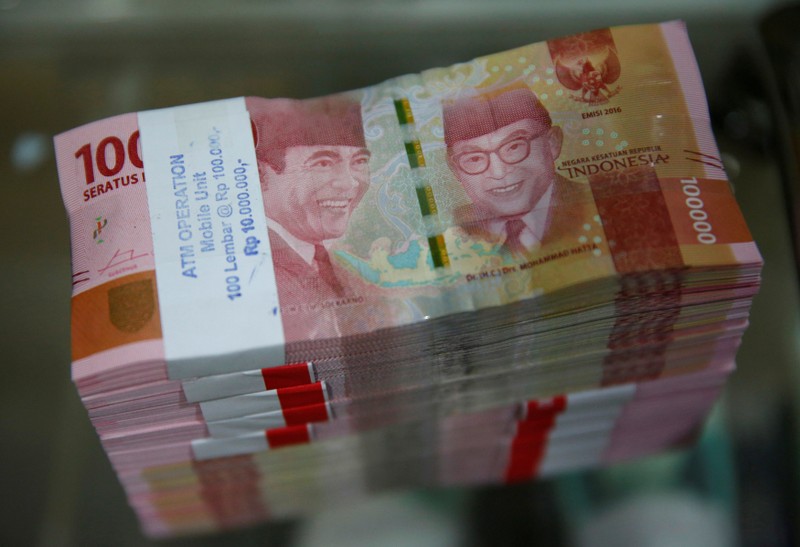
FILE PHOTO: Stacks of Indonesian 100,000 rupiah bank notes are seen on a table in a counting room at Bank Mandiri’s headquarters in Jakarta, Indonesia November 14, 2017. REUTERS/Darren Whiteside/File Photo
July 27, 2018
By Maikel Jefriando and Fransiska Nangoy
JAKARTA (Reuters) – Bank Indonesia has done more than any Asian peer to defend its currency amid a global rout in emerging markets, but the fact that the rupiah has kept slipping suggests the central bank would struggle to maintain the pace in a prolonged battle.
Like many developing markets with current account or trade deficits, Southeast Asia’s largest economy is hostage to forces outside its control, including rising U.S. interest rates, higher oil prices and the Washington-Beijing trade conflict.
And the difficult position Indonesia authorities face “may not end quickly”, PT Bank Central Asia CEO Jahja Setiaatmadja told reporters on Thursday. “This is truly a marathon.”
What differentiates Indonesia is how strongly the central bank has come out of the blocks.
Bank Indonesia (BI) has lifted rates 100 basis points, twice what the Philippines has done, and has drawn more heavily on its foreign reserves than other Asian nations have.
Still, the rupiah <IDR=> is down more than 6 percent in 2018, nearly as much as the peso <PHP=> and Indian rupee <INR=>. Bond yields went down after Indonesia’s 50 bps June rate hike – which BI said reflected a “pre-emptive, front-loading and ahead-of-the-curve” policy – as investors gave their thumbs-up, but the reprieve proved temporary.
AN OPEN ECONOMY
For sure, economists do not perceive the lackluster results in stabilizing the market as a failure. Much is due to the fact Indonesia’s economy is more open than India’s or the Philippines’ and its financial markets have larger foreign investor participation.
But limited results raise concerns about BI’s firepower in case the Sino-U.S. trade conflict escalates and lasts for years, or U.S. heads into recession.
In such an environment, BI’s traditional tools won’t be enough. Further hiking rates at this pace will choke growth and add to pressure on the currency. And foreign exchange reserves are only $20 billion above the $100 billion mark at which some economists expect BI to turn less interventionist.
Given policy constraints, the economy “may not be able to able to handle more rate hikes”, Paul Mackel, HSBC head of global emerging markets FX research in Hong Kong, said in a note.
Mackel said Indonesia might consider temporarily requiring exporters to sell some FX proceeds and curb importers’ FX purchases, similar to what Malaysia did in 2016.
President Joko Widodo on Thursday pleaded with exporters to bring home earnings they currently keep offshore to help manage the rupiah from falling further, Finance Minister Sri Mulyani Indrawati said on Friday.
Indonesian authorities, who know they need a multi-pronged approach, have revived an old tool and created a new one they hope will help the rupiah.
To give foreign investors more instrument choices, they auctioned 9- and 12-month Bank Indonesia Certificates (SBI) for the first time since 2016, raising 6 trillion rupiah ($412.51 million). The instruments, which foreigners can buy in secondary markets, help bring more capital in and let BI mop up the dollars investors sell to purchase the bonds and rebuild reserves.
Next week, BI launches a new benchmark for overnight interbank money markets, called Indonia, mirroring euro zone’s and Britain’s Eonia and Sonia. It aims to improve the transmission of BI rate moves to the financial sector.
Beyond reserves, the central bank “has at its disposal a number of measures” to counter FX volatility, said Roland Mieth, emerging markets portfolio manager at PIMCO in Singapore.
FINDING DOLLARS
The finance ministry is also reducing rupiah bond issuance, hoping to meet some financing needs with additional foreign-currency loans from lenders such as the World Bank and the Asia Development Bank.
“We are getting many offers, but we are only taking what is needed to cover the shortfall in our rupiah bond issuance,” Scenaider Siahaan, finance ministry director of borrowing strategy told Reuters.
Foreigners, who hold more than one-third of Indonesia’s government bonds, sold nearly 29 trillion rupiah ($2 billion) of local currency bonds in April to June. Following BI’s 50 bps benchmark hike, this month has seen 5 trillion rupiah returning.
While the central bank has been “very much” proactive, that doesn’t mean Indonesia is out of trouble, said Rohit Garg, emerging market fixed-income and foreign exchange strategist at Bank of America Merrill Lynch in Singapore.
“If trade tensions do increase… there is only so much that BI can do to make sure that rupiah weakness is limited,” he said.
(Additional reporting by Tabita Diela and Cynthia Silviana in Jakarta, and Marius Zaharia in Hong Kong; Editing by Marius Zaharia and Richard Borsuk)

